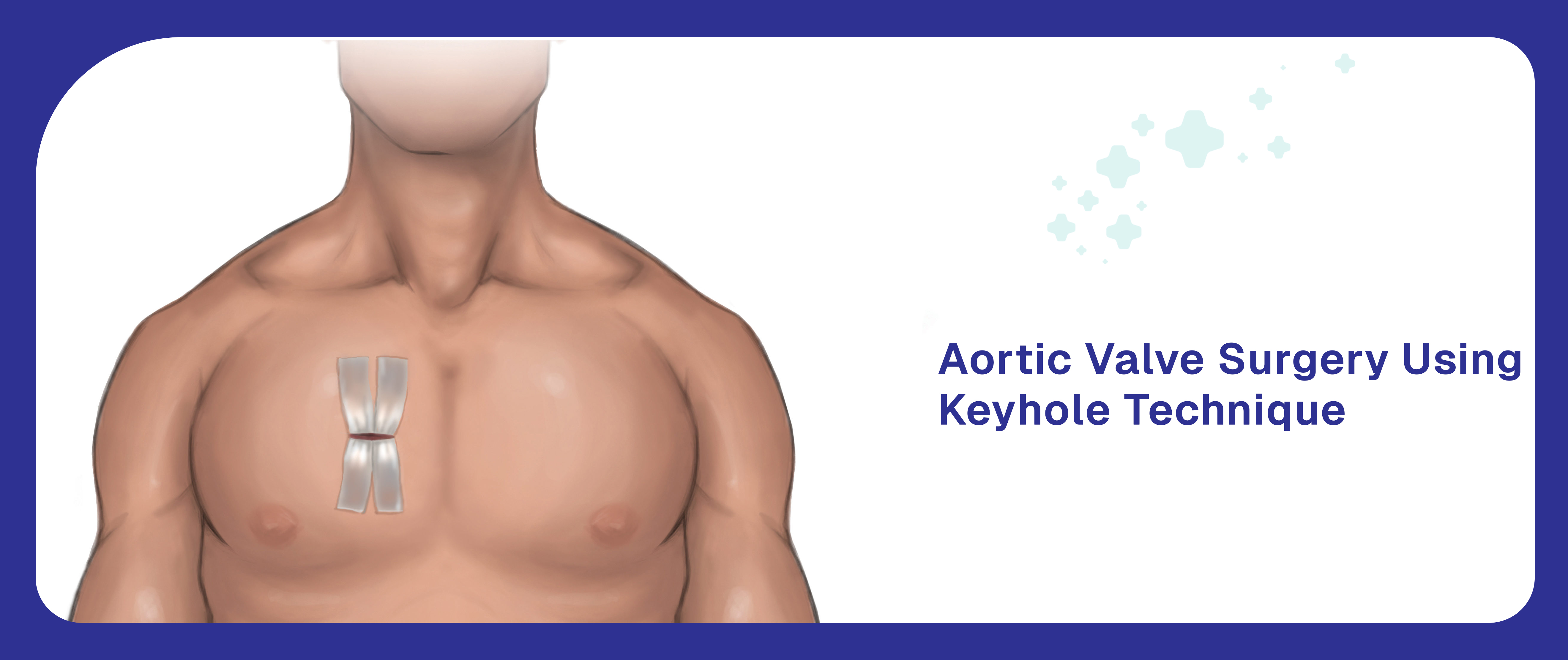03 Feb 2026
Rhinoplasty Revision Surgery in Mohali: Cost When Your First Nose Job Fails


Dr. Ishant Singla
18 Nov 2024
Call +91 80788 80788 to request an appointment.
AORTIC VALVE SURGERY USING KEYHOLE TECHNIQUE
Severe Aortic Valve Regurgitation, Severe Aortic Stenosis and Aortic Aneurysms Can Be Repaired or Replaced By Keyhole To Speed Up Recovery
Aortic valve regurgitation (AR) is a condition where the aortic valve fails to close properly, allowing blood to flow backward from the aorta into the left ventricle during diastole. When severe, this can lead to significant cardiac complications and requires timely intervention. Dr Ishant Singla is specialized in minimally invasive techniques, his thorough knowledge of valve anatomy and advanced surgical approaches have dramatically improved outcomes for patients with severe AR/AS.
Aortic valve stenosis is a type of heart valve disease (valvular heart disease). The valve between the lower left heart chamber and the body's main artery (aorta) is narrowed and doesn't open fully. This reduces or blocks blood flow from the heart to the aorta and to the rest of the body.
Treatment of aortic stenosis depends on the severity of the condition. You may need surgery to repair or replace the valve. Without treatment, severe aortic valve stenosis can lead to death.
Measurement Techniques
We typically use a combination of echocardiography, CT aortography, and MRI to assess aortic dimensions. Transthoracic echocardiography (TTE) is our first-line imaging modality, but transesophageal echocardiography (TEE) often provides more detailed information about valve morphology and aortic dimensions
Symptoms
Aortic valve stenosis ranges from mild to severe. Symptoms generally occur when narrowing of the valve is severe. Some people with aortic valve stenosis may not have symptoms for many years.
Symptoms of aortic valve stenosis may include:
• An irregular heart sound (heart murmur) heard through a stethoscope
• Chest pain (angina) or tightness with activity
• Feeling faint or dizzy or fainting with activity
• Shortness of breath, especially with activity
• Fatigue, especially during times of increased activity
• Rapid, fluttering heartbeat (palpitations)
• Not eating enough (mainly in children with aortic valve stenosis)
• Not gaining enough weight (mainly in children with aortic valve stenosis)
Aortic valve stenosis may lead to heart failure. Heart failure symptoms include fatigue, shortness of breath, and swollen ankles and feet.
Minimally Invasive Approaches to Aortic Valve Surgery
As a pioneer in keyhole heart surgery, I’m particularly excited about the advancements in minimally invasive techniques for aortic valve procedures. These approaches offer significant benefits to patients while maintaining the efficacy of traditional open surgery.
Benefits
– Reduced surgical trauma
– Faster recovery time compared to full sternotomy
– Improved cosmetic outcome
– Decreased risk of sternal wound complications
– No bone breaking, leading to the quickest healing time
– Minimal surgical trauma
– Excellent cosmetic results with a barely visible scar
– Significantly reduced pain compared to sternotomy approaches
– Near-zero risk of sternal wound infections
– Faster return to normal activities, often within 7-10 days.
Conclusion
Severe aortic regurgitation and Severe aortic stenosis, whether in trileaflet or bicuspid valves, requires careful evaluation and timely intervention. Understanding the underlying anatomy, accurately measuring the aorta, and choosing the appropriate surgical approach are all crucial elements in ensuring the best outcomes for our patients.
As surgical techniques continue to evolve, we’re seeing a shift towards more valve-sparing procedures and minimally invasive approaches. At The Livasa Hospital Mohali, we’re committed to offering our patients the most advanced and least invasive options available. Whether it’s a complex valve repair or a keyhole aortic valve replacement, our goal is always to provide the best possible care with the quickest recovery time.
Rhinoplasty Revision Surgery in Mohali: Cost When Your First Nose Job Fails
Plastic Surgery After Massive Weight Loss: Body Contouring Packages in Mohali
ENT + Cosmetic in Mohali: Septoplasty for Breathing with Cosmetic Rhinoplasty Offers
+91 80788 80788
Livasa Healthcare Group Corporate Office,Phase-8, Industrial Area, Sector 73, Sahibzada Ajit Singh Nagar, Punjab 160071
livasacare@livasahospitals.in
| Mohali | +91-99888 23456 |
| Amritsar | +91-99887 49494 |
| Hoshiarpur | +91-99883 35353 |
| Nawanshahr | +91-75081 82337 |
| Khanna | +91-98888 05394 |